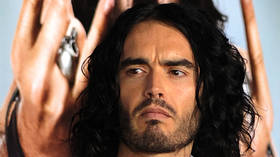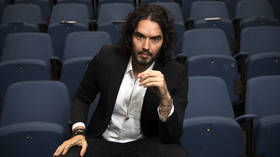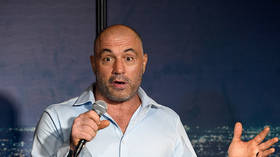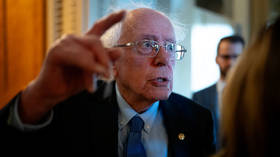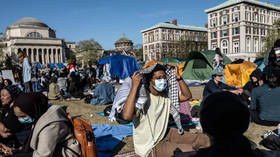Why Russell Brand is unlikely to face actual justice

Last week, the controversial comedian and movie star Russell Brand became the latest high-profile target of the #MeToo movement.
This should not come as a complete surprise, given his celebrity status and sordid history of self-confessed promiscuity. Brand has been a potential target in waiting for some years – and it was probably just a matter of time before the movement zeroed in on him.
The attack on Brand followed the well-rehearsed, standard #MeToo modus operandi. A number of anonymous women, none of whom could ever hope to attain the celebrity status of their male target, have accused Brand of various kinds of sexual misconduct – including, most seriously, rape.
These alleged acts occurred some years ago, and none were reported to the police at the time they supposedly occurred. Nor have these acts been reported to the police even now.
Making a formal complaint to the police would, of course, involve the police independently investigating the allegations – at least to the extent that the British police are capable of impartially investigating allegations of this kind.
The ideological predisposition of the police in respect of such matters can perhaps be gauged from the statement issued by them after the media storm against Brand broke last week – the police immediately urged any victims of Brand’s sexual indiscretions to contact them and make complaints against him.
It is unlikely that the women who have targeted Brand will make formal complaints to the police at this stage – that usually occurs long after the media campaign against the target has destroyed his reputation and career, and seriously prejudiced the likelihood of a fair trial occurring.
#MeToo complainants tend to avoid the courts if they can – because the law is based upon notions such as the presumption of innocence and the right to a fair trial. The law also requires complainants to justify their allegations by means of credible evidence; and subjects them to cross-examination.
Such notions and practices are completely foreign to the persecutory #MeToo modus operandi. More to the point, they afford the accused a degree of protection that, in some cases, may even enable them to escape the destructive rage of the movement altogether. Complainants prefer trial by an ideologically compliant media, as Brand is now discovering to his cost.
No one, of course, has any idea whether the allegations made against Brand are true or not. Brand has denied them – and his accusers have, in typical #MeToo fashion, criticised his response as “insulting.”
This denial of the right to defend oneself follows logically from the fundamental assumption that all complainants tell the truth and all targets are liars – an assumption, incidentally, that the courts regularly demonstrate to be false.
The allegations against Brand, as in all #MeToo cases, are a curious amalgam of the serious (rape) and the trivial (asking one girlfriend to read Vladimir Nabokov’s novel ‘Lolita’). Ultimately, whether they are actually proved true or not will be a matter for the courts – if, indeed, the allegations made against Brand ever get before a court.
Not that credible proof really matters, because Brand has already been found guilty as charged by the media. In the space of a few days, his reputation has been irretrievably damaged and his career is being progressively destroyed. Brand’s current stand-up comedy tour in Britain has been cancelled. He has been condemned by media organisations that once vied to employ him, and celebrities who once willingly basked in his reflected glory. Charities that he has supported have cast him aside, and ex-wives and former girlfriends have vengefully denounced him.
Such is the extraordinary ideological dominance and power of the #MeToo movement that it now, in quasi-totalitarian fashion, compels other organisations and individuals to become complicit in the persecution of its targets.
The BBC and Channel 4 – both former employers of Brand – have set up ‘enquiries’ into the allegations made against him. These enquiries will typically not afford Brand natural justice, and will not involve any rigorous testing of the allegations made against him. Findings of guilt will no doubt be made and, in accordance with the basic #MeToo playbook, both organisations will inevitably issue grovelling apologies for having unknowingly permitted Brand to have behaved as he did.
In one of the latest cancellation moves, Brand's upcoming Australian tour has now been called off before it was even officially announced. Which comes as no surprise, given the country's history with #MeToo-style cases – where multiple careers have been ruined before the defendants even got a chance to legally stand up for themselves.
#MeToo vs. justice – Australia’s experience
Australia, like all Western liberal democracies, has been a fertile hunting ground for the #MeToo movement over the past decade. Some years ago, the prominent actor Geoffrey Rush was accused by a number of unknown actresses of having committed sexual assaults and other sexual indiscretions. The media published these allegations without testing them, and Rush’s successful international acting career was destroyed overnight.
Rush, however, successfully sued the media organisations for defamation and was awarded a record $3.5 million in damages. The judge in Rush’s case made a finding that the key complainant had lied, and Rush obtained a vindication of sorts – though his career never really recovered.
Prominent cricketer Chris Gale also sued for defamation when he was subjected to a similar #MeToo attack, and obtained a six-figure damages award. The jury in Gale’s case believed the cricketer and disbelieved the complainant.
A number of prominent footballers have been recently targeted by the movement in Australia, and some have been criminally charged with rape. In a number of these cases, juries have acquitted the accused sportsmen – and in some cases, it has become apparent that the prosecutions should never have been brought in the first place.
One of the major ideological victories that the #MeToo movement has achieved is to have convinced police that they are obliged to charge alleged offenders in all cases – no matter how weak and flimsy the evidence against them may be.
The most sensational Australian #MeToo case is, of course, the infamous Brittany Higgins saga – which is still winding its way through the courts, after having wreaked destructive havoc upon the Australian Capital Territory (ACT) legal system.
Higgins was an unknown staffer in a federal minister’s Parliament House office in Canberra who claimed that she was sexually assaulted in the minister’s office by a male colleague, Bruce Lehrmann – after they improperly gained access to the office late on a Saturday night after an evening of binge drinking.
Although urged to report the alleged rape to the police by the minister, Higgins refused to make a formal complaint to police. Some two years later – in the middle of another sensational #METOO case that led to the destruction of the career of the conservative federal Attorney-General Christian Porter – Higgins went public with her allegation that she had been raped in Parliament House.
Journalists committed to the #MeToo cause turned Higgins into a poster girl and she became an overnight celebrity – who campaigned against the conservative Morrison government that lost office some 12 months later. This politicised media campaign destroyed Bruce Lehrmann’s reputation and career.
Higgins made a formal complaint to the police two years after the event in question, and Lehrmann was charged with sexual assault – notwithstanding that ACT police officers had serious doubts about Higgins’ credibility.
Lehrmann’s trial in the ACT Supreme Court was aborted late last year, after a juror misconducted himself, but the trial itself was mired in controversy. Lehrmann had applied to have the proceedings permanently stayed on the basis that the extensive media campaign conducted by Higgins and the #MeToo movement for the best part of a year made it impossible for him to receive a fair trial – but his application was refused.
Then, during the trial, Higgins was granted the extraordinary indulgence of being given a four-day break during her cross-examination on the basis of alleged mental health problems.
After the trial concluded, Higgins made an inflammatory speech on the steps of the court condemning the legal system, and although this constituted a clear contempt of court, no action was taken against her. Then, earlier this year, an unseemly dispute between the ACT police and the director of public prosecutions (DPP), Shane Drumgold – who had prosecuted Lehrmann – broke out in the media. It became clear the police believed that Lehrmann should never have been charged, and were also of the view that Drumgold had behaved improperly during the entire Higgins matter.
The left-leaning Labor-Greens ACT government was forced to establish an enquiry into Lehrmann’s prosecution, and appointed a distinguished former judge from Queensland, Walter Sofronoff K C, to conduct it.
Sofronoff handed down his findings to the ACT government last month. He found that Drumgold had acted without “fairness and detachment”; that he had withheld evidence from Lehrmann’s lawyers; that he had deliberately lied to the trial judge; and that he had prepared a false document that had misled the trial judge.
These are all findings of very serious misconduct – and make clear that Drumgold was a fervent #MeToo ideologue who was willing to do virtually anything in order to obtain a conviction that would satisfy the movement.
How did the ACT government respond to Sofronoff’s findings? Initially it sought to delay release of the report, but Sofronoff – who seems to have anticipated such a ploy –had supplied advance copies to the media, thereby ensuring that his findings would become public.
The ACT government then mounted a campaign to discredit Sofronoff, and refused to establish an enquiry into other sexual assault cases that Drumgold had been involved in.
Drumgold has now commenced legal proceedings in the ACT Supreme Court to have the Sofronoff report quashed – while Lehrmann has foreshadowed a multi-million-dollar claim against the ACT government based upon Drumgold’s misconduct and flawed prosecution.
The Higgins debacle has destroyed the reputation of the entire ACT legal system – such as it was – and has exposed the #MeToo movement’s ruthless desire to circumvent the legal system that it – quite correctly, from its point of view – sees as preventing it from achieving its aims.
What will happen in the Russell Brand matter is not clear, but in general terms Brand’s fate appears sealed – his reputation is destroyed, his career is in tatters, and perhaps he will find himself defending criminal charges sometime down the track.
All on the basis of anonymous, completely untested historical allegations published by irresponsible media organisations that are firmly committed to the #MeToo cause.
Chalk up another wonderful victory for the #MeToo movement.
The statements, views and opinions expressed in this column are solely those of the author and do not necessarily represent those of RT.
